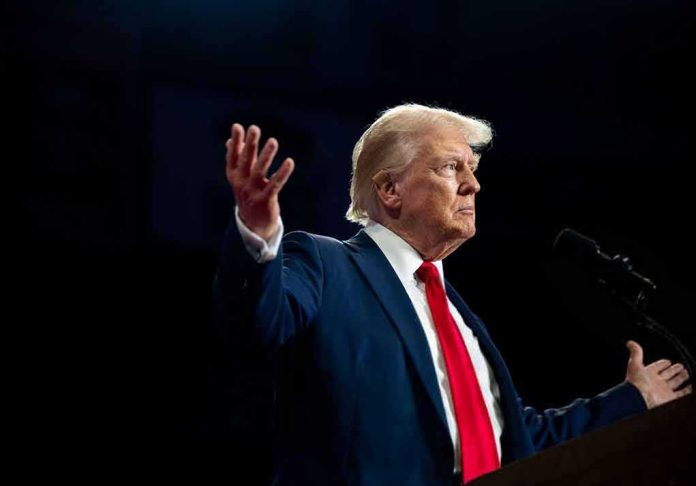
Trump’s nomination of Rebecca Taibleson to the Seventh Circuit Court of Appeals has ignited debate over whether she truly embodies constitutional conservative values or harbors leftist sympathies masked by her professional pedigree and political donations.
Story Snapshot
- Trump nominates Rebecca Taibleson, a former clerk for Justices Kavanaugh and Scalia, to the Seventh Circuit Court of Appeals.
- Taibleson’s and her husband’s donations to Democrats raise concerns about her ideological alignment.
- The bipartisan selection process and scrutiny reflect broader debates about judicial impartiality and conservative loyalty.
- Confirmation could shift the Seventh Circuit’s long-term jurisprudence and influence key legal battles in the Midwest.
Trump’s Judicial Strategy: Securing Conservative Ground
President Trump’s judicial appointments have consistently targeted judges with strong conservative and originalist credentials, aiming to reclaim federal courts from left-leaning influence. Taibleson’s clerkships for Supreme Court Justices Brett Kavanaugh and Antonin Scalia position her as a jurist likely to defend constitutional limits and traditional values. Her career as Assistant U.S. Attorney and DOJ official further demonstrates the administration’s preference for candidates who understand the importance of law, order, and individual liberty. Yet, questions linger among Trump’s base: do her political donations align with the values conservatives want to see on the bench?
Trump’s new judge pick: True constitutionalist or hidden Democrat? https://t.co/65StbsD0TA pic.twitter.com/jDBtqNGACW
— TheBlaze (@theblaze) September 9, 2025
The Seventh Circuit Court of Appeals covers Illinois, Indiana, and Wisconsin—states pivotal to national legal trends. Judge Diane Sykes, known for her conservative rulings, is stepping down, and conservatives expect her successor to strongly defend the Constitution. The Federal Nominating Commission, a fixture in Wisconsin since the 1970s, recommended Taibleson alongside other candidates, with bipartisan input from both Democratic and Republican senators. While the process ensured candidate vetting, the focus now shifts to whether Taibleson’s record and philosophy genuinely reflect the agenda President Trump promised: restoring judicial restraint, upholding the Second Amendment, and pushing back on activist legal trends.
Political Donations and Judicial Independence: The New Battleground
Taibleson’s nomination has drawn unusual attention to her and her husband’s political donations, particularly contributions to Democratic campaigns. This scrutiny is rare for federal judicial appointments and has fueled speculation about her true ideological leanings. Advocacy groups and media outlets have published fact sheets dissecting her donation history, raising concerns about impartiality and whether her judicial decisions could be swayed by progressive interests. For many in Trump’s constituency, the integrity of the courts depends on judges who reject globalist, woke, and activist agendas—making donations to Democrats a red flag. Still, legal experts caution that professional qualifications and judicial philosophy should carry more weight than political contributions alone.
Senator Ron Johnson, a leading Republican voice in Wisconsin, has endorsed Taibleson, emphasizing her legal acumen and conservative credentials. President Trump’s announcement highlighted her commitment to defending the Constitution and rule of law. Despite these assurances, some conservatives remain wary, demanding transparency and firm proof that she will not betray core values such as gun rights, religious freedom, and parental authority in education. The ongoing Senate confirmation hearings offer a critical opportunity for lawmakers to probe her views and test her resolve under pressure.
Impact: Shaping the Midwest—and the Nation’s Legal Future
If confirmed, Taibleson could influence the Seventh Circuit’s direction for decades, affecting high-stakes decisions on labor, civil rights, regulatory issues, and state sovereignty. Her rulings may set precedents that either reinforce or erode constitutional protections, with consequences for families, businesses, and communities across the region. The nomination’s partisan debate reflects deeper anxieties about the politicization of the judiciary and the role of money in shaping legal outcomes. Conservative groups warn that any concession to progressive or globalist interests could undermine efforts to restore the courts and protect America’s foundational principles.
Taibleson’s case exemplifies the growing intensity of judicial nomination battles in the Trump era, with every detail—career history, personal affiliations, and financial records—under a microscope. The long-term impact of her appointment will depend not only on her decisions but also on the vigilance of those committed to limited government and constitutional order. As advocacy organizations step up monitoring and publicize candidates’ backgrounds, the stakes for future nominations will only rise. For Trump supporters, the challenge remains clear: secure judges who will defend America’s core values against all threats, foreign or domestic, and resist the tide of progressive overreach.
Sources:
Trump taps Taibleson for 7th Circuit
Trump nominates Taibleson to 7th Circuit Court
Rebecca Taibleson – Alliance for Justice
Rebecca Taibleson: An Excellent Pick for the Seventh Circuit



